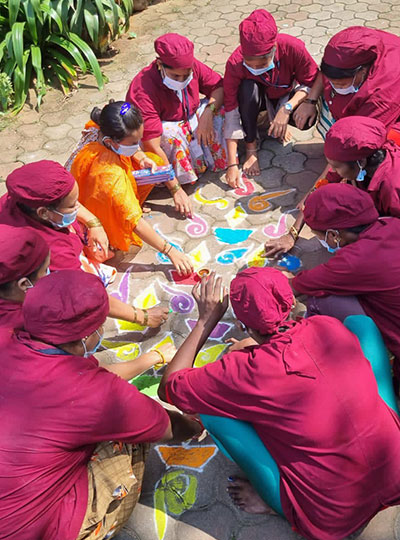
ARZ was founded by a dedicated group of professionals from the Tata Institute of Social Sciences (TISS). Between 1994 and 1997, the founders were engaged in a national study titled ‘Initiative Taken in Rescue and Rehabilitation of Women and Girls in Prostitution’. This study led to the development of the Mukti-Model, an intervention approach aimed at combating sex trafficking.
In 1997, ARZ was established in Vasco, Goa, specifically in the Baina red-light area, to implement this model. The primary objective of ARZ was to break the cycle of commercial sexual exploitation in Baina. At its peak in 1998, Baina had around 1,200 women, 57 gharwalis, and numerous others involved in the trade. It was common to see minor girls, as young as 12 to 13 years old, soliciting customers on the streets. These women and girls faced severe physical violence, such as beating, choking, burning, sexual assault, gang rape, and psychological abuse including manipulation, threats, and blackmail by traffickers and customers alike.
Initially, ARZ's work through the Mukti-Model focused on four main interventions: prevention of entry into sex trafficking, protection of victims and vulnerable populations, prosecution of perpetrators, and rehabilitation of victims. However, through 25 years of engagement with the community and stakeholders, ARZ's interventions have become more holistic. This evolution now includes the reform of perpetrators, training of stakeholders, research, and advocacy on sex trafficking, and, most importantly, providing alternative livelihood options. A crucial element in this progress was mobilizing government machinery, working closely with the state protective home, and leveraging ARZ's expertise to provide comprehensive services.
ARZ is registered under the Indian Societies Registration Act (1860), Bombay Trust Act (1950), and U/s 80(G) of the Income Tax Act. Although the organization primarily operates in Goa, it also extends services to certain districts of Karnataka, Maharashtra, Andhra Pradesh, Tamil Nadu, West Bengal, and Orissa, identified as key source states, as well as neighboring countries Nepal and Bangladesh, identified as key source countries. Key functional areas include prevention, protection, rescue, repatriation, rehabilitation, health, after-care, reintegration, prosecution of perpetrators, legal counseling, economic rehabilitation, research, documentation, training, and advocacy.
The organization has been appointed as the nodal NGO in the Integrated Anti-Human Trafficking Unit, set up by the Goa Police. This role involves providing witnesses, conducting rescue operations with the police, training and counseling rescued persons, assisting in interviews, networking with other NGOs, empowering rescued persons, and ensuring their proper rehabilitation. This appointment has enabled ARZ to work closely with the criminal justice system, defining its role in combating trafficking in Goa.
After 25 years of dedicated work and successfully demonstrating the effectiveness of the Mukti-Model in combating sex trafficking, ARZ recognizes the importance of disseminating its experiences and findings on a larger scale. The aim is to organize and align the various stakeholders committed to fighting this heinous crime under a unified approach. ARZ, operating under the Mukti-Model, is now focusing on enhancing its efforts by fostering collaboration among different anti-trafficking initiatives. The goal is to ensure that these entities work with a single-minded purpose: eliminating sex trafficking. Despite significant progress, a new challenge has emerged—anti-trafficking efforts are not as organized and systematic in combating the crime as traffickers are in exploiting vulnerable individuals. This realization underscores the need for a coordinated, strategic approach to strengthen the collective fight against sex trafficking and ensure that all stakeholders operate with the efficiency and effectiveness needed to eradicate this issue.
